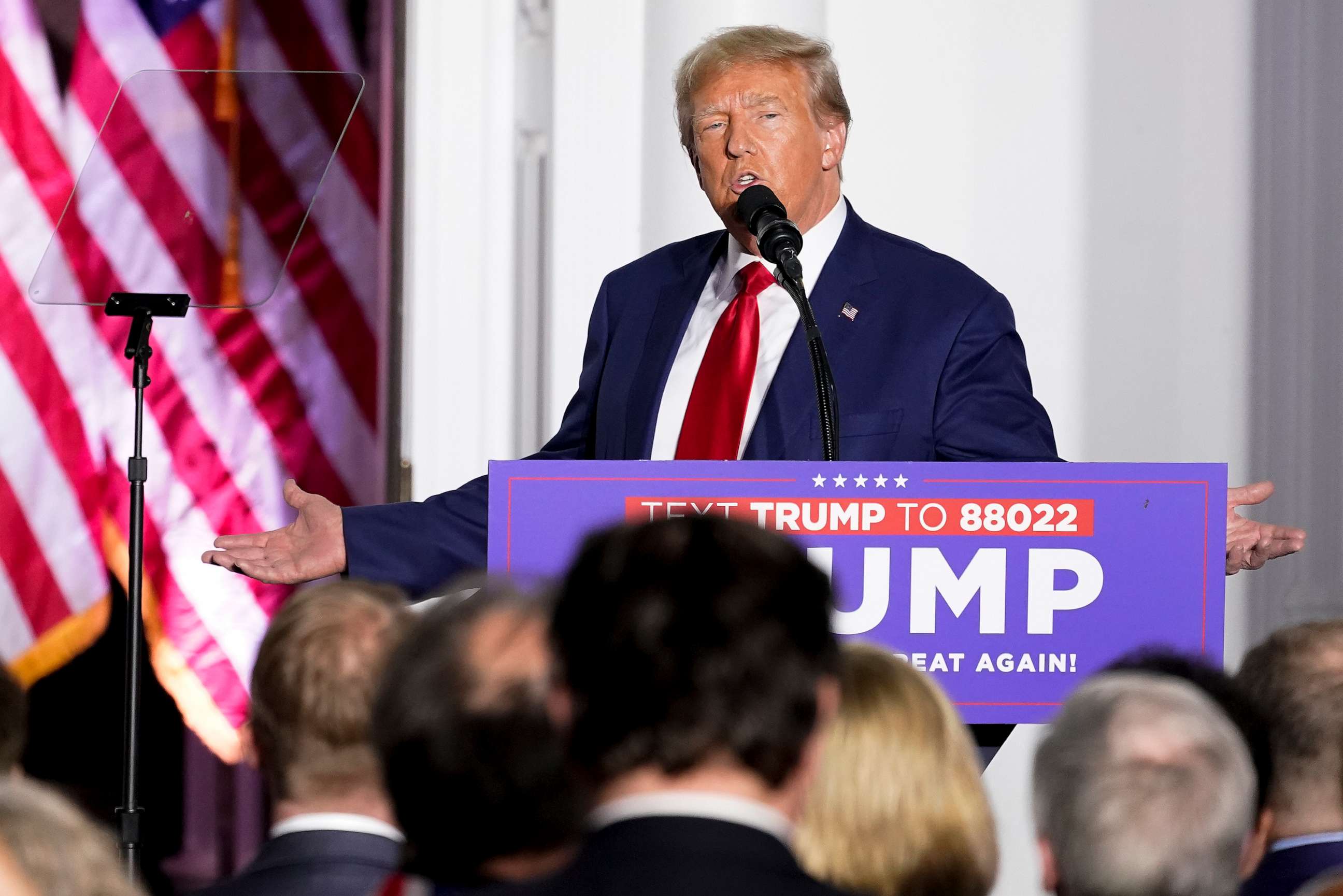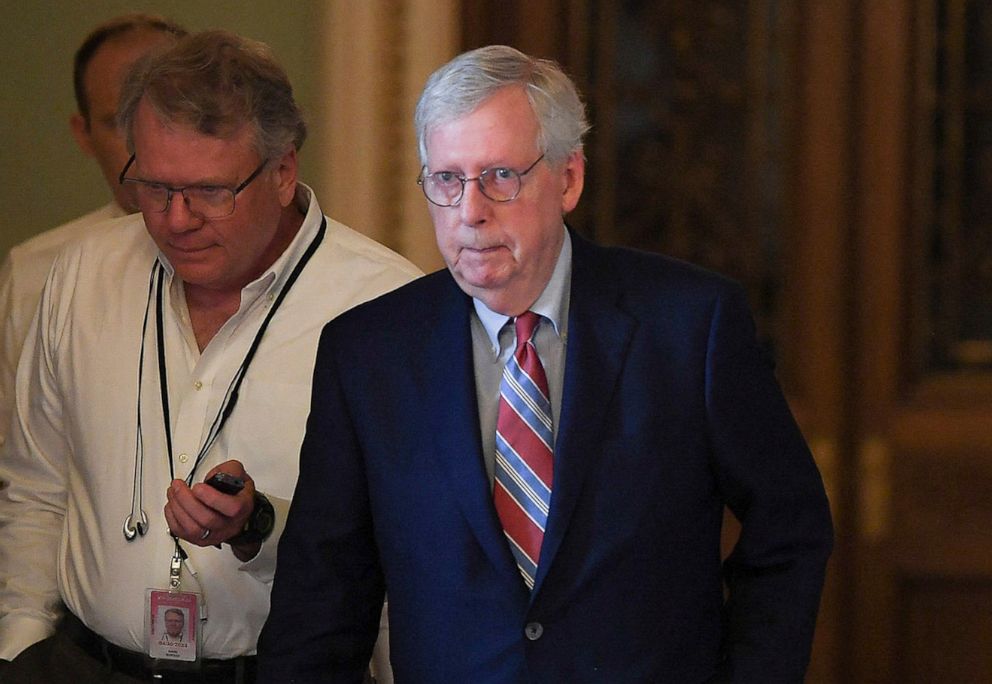Trump's grip on congressional Republicans casts doubt on possible border deal
Senate negotiators are continuing to work on a bipartisan deal as Trump meddles.
With Republican and Democratic senators closing in on a rare bipartisan deal on tough new border security, the fate of any agreement appeared in doubt Friday with key Republicans expressing concern former President Donald Trump could derail the whole thing.
House Speaker Mike Johnson on Friday piled on Trump's pressure to hold off on anything less that a "perfect" deal until after the presidential election, saying the Senate bill could be "dead on arrival in the House anyway."
Trump has made immigration one of his top campaign issues and signaled he wants to deny President Joe Biden a win on the border before November.

"We need a Strong, Powerful, and essentially 'PERFECT' Border and, unless we get that, we are better off not making a Deal," Trump posted on his social media site Thursday night.
A few hours later, Johnson then sent a letter to his House Republican colleagues, obtained by ABC News, saying the Senate "appears unable to reach an agreement on the border."
"If rumors about the contents of the draft proposal are true, it would have been dead on arrival in the House anyways," Johnson said.
Any bipartisan deal the Senate strikes faces an uphill battle in the Republican-controlled House. Johnson has said he's been in regular contact with Trump about the border negotiations, and many hard-liners were inclined to reject a deal even before Trump began getting more vocal on the matter.

For months, Senate Republicans have been pushing Biden for a deal to address the flood of migration at the southern border, calling for policies that would curb his parole authority and slow the flow of migrants into the country.
Biden said he's "ready to act" on changes at the border. Democrats insist that they're ready to make significant concessions to get a deal. For weeks, leaders in both parties have been asserting that the time is right -- with a Republican-controlled House and a Democratic president, to get the job done.
But the political realities of Trump getting closer to winning the GOP presidential nomination with his victory in the Iowa caucuses and the New Hampshire primary have started to wreak havoc on Capitol Hill.
Many House Republicans, including Johnson, want a deal that looks like the House Republican-passed H.R. 2, a sweeping migration reform that includes many proposals that Democrats have outright rejected, and could never pass the Senate.
Despite Johnson's comments, and growing pessimism from some Senate Republicans, bipartisan Senate negotiators are continuing to press forward on a border compromise.
Asked about Trump's comments and Johnson's letter at the White House press briefing Friday, press secretary Karine Jean-Pierre said House Republicans have a choice to make.
"They have to choose whether they want to solve a problem, actually solve a problem like the Senate is trying to do in a bipartisan way. ... Or, you know, get in the way and score political points," Jean-Pierre said. "That's a decision that House Republicans have to make. It's clear that senators, both Republicans and Democrats, have made their decision."
Sen. James Lankford, R-Okla., who has been leading the bipartisan border negotiations on behalf of Senate Republicans, told reporters Thursday -- before Trump's social media post -- "We're still working. I was not instructed by the leader to be able to stop working on this."
Sen. Chris Murphy, D-Conn., the top Senate Democrat working on a deal, said Thursday that negotiators will continue their work, and will find out "in the next 24 to 48 hours" whether Trump's tightening grip on Republicans will blunt negotiators' efforts.
"I am not giving up. I believe that there are still enough Republicans who actually are sincere about fixing the problem that we can get this done," Murphy said. "I hope we don't live in a world today in which one person inside the Republican Party holds so much power that they could stop a bipartisan bill to try to give the president additional power at the border to make more sense of our immigration policy."
The Senate's top Republican, Minority Leader Mitch McConnell, acknowledged the mounting challenge that Trump's desire to use the crisis at the southern border as a campaign talking point will pose to passing legislation during a campaign year.
McConnell, in a closed-door meeting with Senate Republicans on Wednesday, acknowledged that -- after Iowa and New Hampshire -- the "politics have changed" concerning the ongoing negotiations, according to two sources familiar with McConnell's remarks.
While referring to Trump as the "nominee," McConnell acknowledged that Trump's campaign has created a "quandary" in which congressional Republicans "don't want to do anything to undermine" Trump, sources told ABC News.
The comments from McConnell caused a stir on Capitol Hill on Thursday, where some interpreted them as meaning McConnell was backing away from the emerging border deal. Those reports put Senate Republicans on the defensive.

Sen. John Cornyn, R-Texas, said reports that McConnell said there was no path to passing border reform within the current political landscape, or that McConnell is backing away from the border, are a "misinterpretation of what he said."
"I think there was a misinterpretation in this case," Cornyn said. "What he was talking about was what he saw as sort of the political challenges of moving forward. He wasn't waving the white flag on border security at all."
During a closed-door lunch Thursday afternoon, McConnell sought to set the record straight. According to senators at the lunch, the leader reaffirmed his support for the ongoing bipartisan negotiations on the border and Ukraine.
"I think he was saying out loud what a lot of people are thinking of this," Lankford said about McConnell.
"The ambiguity that was around for the last few hours has been clarified for all of us," Sen. Mitt Romney, R-Utah, said. "He's fully behind the border bill, fully behind the support for Ukraine, and is not going to let political considerations of any campaign stand in the way of his support."
Adding to the uncertainty, Senate negotiators haven't yet released the text of their proposals. It's still not clear when bill text will be available, though senators at the negotiation table say they've largely completed their work and are waiting for appropriators to assess the cost of the legislation.
Late Friday, multiple sources familiar with the negotiations confirmed that the bill would give the Department of Homeland Security authority to shut down the border if migration numbers surge over certain levels.
According to the sources, DHS would be required to shut down the border if migrant crossings increased above 5,000 per day in any given week or it could decide to do so if average daily encounters surpassed 4,000 per day in a one-week span.
Also late Friday, Biden released a statement, saying, in part, "What’s been negotiated would – if passed into law – be the toughest and fairest set of reforms to secure the border we’ve ever had in our country. It would give me, as President, a new emergency authority to shut down the border when it becomes overwhelmed. And if given that authority, I would use it the day I sign the bill into law."
Many Senate Republicans have refrained from weighing in on the proposal until they get a chance to view it. But Trump weighing in has caused some to back away from the bill.
Sen. Marco Rubio, R-Fla., who recently endorsed Trump, posted to X that a "deal will allow Biden to pretend he's doing something about the border but it won't solve the problem."
Still, Trump's position has left some Republican senators, who say they're duty bound to act on the border crisis, miffed.
"The fact that he would communicate to Republican Senators and Congress people that he doesn't want us to solve the border problem because he wants to blame Biden for it, is really appalling," Romney said Thursday.
Trump's close ally, Sen. Lindsey Graham, R-S.C., tried to appeal directly to the former president.
"What we're trying to do, will help him if he gets to be president. I will say to President Trump, if we can put this package together, the way I hope it falls into place that you'll have more tools to secure America than you've ever had," he said.
Cornyn said the Senate still needs to take an opportunity to act, regardless of the politics.
"Some people have said, 'Well, the issue is going away and so that will be denying President Trump the issue.' I think that's fantasy," Cornyn said. "Obviously he's an important voice, but we have a job to do and we intend to do it."
ABC News' Mary Bruce, Rachel Scott, Lauren Peller, Mariam Khan and Noah Minnie contributed to this report.




